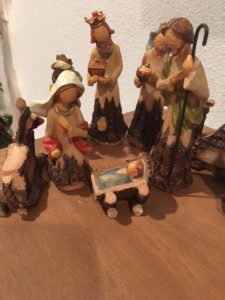 During Advent, Christians around the world celebrate the birth of Jesus the Christ, that is, the Messiah. The promise of the Messiah is a fascinating read in the Old Testament, filled with odd and intriguing phrases, scattered among the writings of different authors over two millennia. The various prophecies sometimes had application to the immediate situation when they were uttered, but there was something else and unusual about them that was hopeful and future looking. Readers over the years began to piece these “clues” together and see an essential narrative that resonated throughout the scriptures.
During Advent, Christians around the world celebrate the birth of Jesus the Christ, that is, the Messiah. The promise of the Messiah is a fascinating read in the Old Testament, filled with odd and intriguing phrases, scattered among the writings of different authors over two millennia. The various prophecies sometimes had application to the immediate situation when they were uttered, but there was something else and unusual about them that was hopeful and future looking. Readers over the years began to piece these “clues” together and see an essential narrative that resonated throughout the scriptures.
Promises of Old
These recorded God’s promises to send someone “born of a woman” to deliver his people from the wreckage of sin and evil (Genesis 3:15), who would be from the descendants of Abraham (Genesis 12:1-3), specifically a ruler from the Tribe of Judah (Genesis 49:10) and the lineage of King David (1 Chronicles 17:11-14). He would be God’s son (1 Chronicles 17:13), born in Bethlehem (Micah 5:2) to a virgin, and be the very presence of God on earth (Isaiah 7:14), who would establish and reign over his kingdom in justice and righteousness forever (Isaiah 9:6-7). The Jewish people, especially in the context of 1st Century Roman oppression, eagerly awaited this Messiah and the kingdom he would establish.
Disrupted Thinking
Jesus came and disrupted all their expectations. It’s not that he didn’t claim to be the Messiah — he did (see, e.g., John 4:25-26). And it’s not that the promises of the Old Testament weren’t fulfilled — the New Testament chronicles how they were. Many of the people sensed this, seeing the things that Jesus said and did and wondering in astonishment “Could this be the Son of David?” (Matthew 12:23). Even up to the weekend of Jesus’ death, the crowds in Jerusalem welcomed him triumphantly, waving palm branches and shouting: “Hosanna to the Son of David!” (Matthew 21:9). The disruption was in Jesus telling them that the promised kingdom of God they were looking for is not visible to the naked eye but nonetheless present in their midst because it is a spiritual kingdom, transcending time and space (Luke 17:20-21). That is because “God is spirit, and his worshipers must worship in the Spirit and in truth” (John 4:24). It follows, then, that in order to see or enter God’s kingdom, as Jesus said, our birth as humans is not sufficient—we must also experience a spiritual birth (John 3:3-5).
The Essential Narrative
Many think of the Christmas narrative as that of a baby born in a manger, attended by the stable animals, his Mom and Dad, and some wide-eyed shepherds and wise-men bringing gifts and making a fuss over his arrival. That’s all part of the story, but not what grabs my attention. The essential narrative I think about is that in response to our disobedience, God in His love promised to send someone to save us from our sins and undo the work of our spiritual adversary. The one promised would be born of a woman, from the descendants of Abraham, the tribe of Judah, and the house of King David. He would be God’s Son, born to a virgin in Bethlehem, who would establish and reign over a kingdom that will never end, where love prevails and justice and peace are realized, and all things are being redeemed, restored and made new.
That’s the Christmas story that never gets old to me. The Advent, or “arrival,” of this Promised One and the fulfillment of God’s promises is indeed “good news that will cause great joy for all the people. Today in the town of David a Savior has been born to you; he is the Messiah, the Lord!” (Luke 2:10-11)
